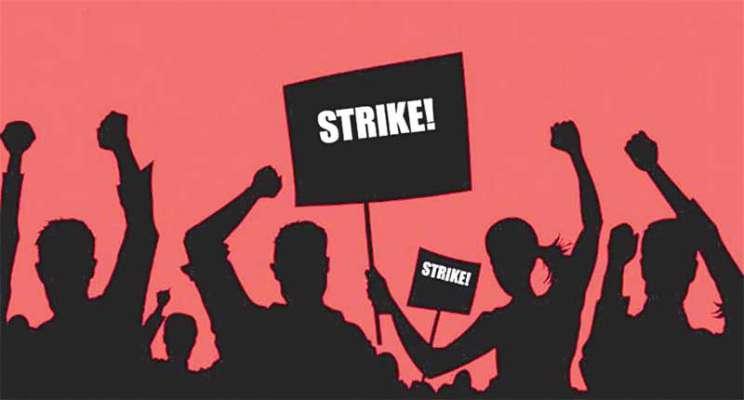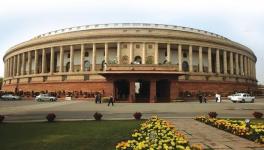Jan 8 Strike: Bengal Worker, Farmer Leaders Expect Good Response Despite Possible Govt ‘Hurdles’

Representational Image. Image Courtesy: Dailyhunt
Kolkata: Organisers of the all-India industrial strike and Grameen Bharat bandh in West Bengal are gearing up to ensure that the spirit their campaign strategy, which was drawn up at the national level by 10 Central trade unions and the All-India Kisan Sangharsh Coordination Committee, is a success on January 8.
Though West Bengal’s chief minister Mamata Banerjee has not said anything about the strike so far, the organisers here are proceeding on the premise that her party, Trinamool Congress, and its trade union arm, may try to create “tactical obstacles”, and say they are ready to thwart any attempt to foil the protest and subdue the impact of the strike.
Since the planned protest, to quote national secretary of the Centre of Indian Trade Unions (CITU) A R Sindhu is “bottoms up: from village to national level”, one obvious step from the ruling TMC could be to persuade truckers not to join the strike and deploy larger than the usual number of government buses on that day.
“We have received reports from Nabanna – the state secretariat – to this effect,” general secretary of CITU state committee, Anadi Sahu (a former labour minister of the Left Front government), told NewsClick.
Another common practice is to warn workers, shopkeepers, traders of “consequences” if they join the protest or lend support in any form. This tactic has usually been adopted by TMC or its trade union activists.
Chandi Banerjee, general secretary of Colliery Mazdoor Union (INTUC) in Eastern Coalfields (ECL), said already warnings have been “quietly” issued to certain mine areas of ECL.
Asked how they have proceeded in their awareness and mobilisation campaigns, Sahu said a large number of meetings, marches – long and short distance -- in towns and factory areas were organised in the past five-six weeks.
On Monday, street corner meetings in several railway station areas will be held. On Tuesday, too, union members, supporters and sympathisers will march and hold rallies in the proximity of factory gates. Over two lakh persons participated in the long and short-distance marches, which covered nearly 9,300 km in the state, he said.
Asked about the political part of the all-India strike, Sahu said: “We are protesting the Citizenship (Amendment) Act 2019 and proposed National Register of Citizens. Mamata Banerjee is also protesting CAA and NRC. But, we are telling the people that they should remember her past political record and, therefore, not get carried away by what she says.”
Sahu alleged that after her meeting with the Prime Minister and Home Minister in New Delhi in September last, “Banerjee seems to have managed to avert the arrest of TMC leaders reportedly involved in the Saradha chit fund scam and the Narada bribery issue. She also averted the arrest of IPS officer Rajeev Kumar who has full knowledge of what happened and who all are involved. CBI was seeking his custody for interrogation”, he added.
Inquiries suggest an intensive and extensive contact programme has been carried out by Paschim Banga Pradeshik Krishak Sabha, the farmers’ arm of the Communist Party of India (Marxist). Joining it, among others, are Paschim Banga Pradeshik Krishak Sabha (BB Ganguly Street), farmers’ wing of the Communist Party of India and Kisan outfits of CPI (M-L) Liberation, Revolutionary Socialist Party and Forward Bloc.
The Secretary of Paschim Banga Pradeshik Krishak Sabha, Amal Halder, told NewsClick that in West Bengal the benefits that had accrued to farmers and ‘khet mazdoors’ (agricultural labour) and the dignity that they earned as a result of land reforms carried out by the erstwhile Left Front government had been systematically eroded under the TMC regime that started in May 2011.
Under the system ushered in now, farmers were getting much less than the minimum support price for paddy because of deduction on account of moisture and ‘impurities’, he said.
Many land-owning farmers had opted for contract farming and because of manipulations by the ruling TMC members, those who actually do the farming are being deprived of their genuine dues. Also, compensation given by the state government because of damages caused during natural disasters is handed over to land-owning farmers.
”We have been telling the government to find out from the fields who have actually done the farming, but our appeals have been falling on deaf ears”, Halder said.
Recent times have also seen the emergence ‘neo rich’ who are taking large areas on lease and managing to create conditions in which they are becoming “political leaders with clout”. Hence, the genuine dues and demands of ‘kisans’ and mazdoors are none of their concern, Halder observed.
He said that during TMC rule, 218 farmers had committed suicide and of those, as many as 168 suicides were in the Bardhaman Purba and Paschim districts (larger number in the former).
Ajit Mukherjee, who leads the CPI’s farmers’ organisation, said because of widespread distress and CAA-NRC as add-ons, which are causing serious concern, the farmers were responding to our appeal to join the strike on January 8. “We are pretty optimistic that they will stay away from fields”, he said.
Ashok Ghosh, who heads the state unit of United Trade Union Congress, labour arm of RSP, said the disenchantment of industrial workers and agricultural labour was writ large on their faces. “I am visiting the North Bengal districts to mobilise support of our union workers in tea plantations and adjoining areas. They are giving us a patient hearing”, he said.
The ECL union leader said coal mine workers were aggrieved because of disinvestment in Coal India Ltd and the Centre’s over-enthusiasm to hand over well-run, regularly profit-making public sector undertakings to the private sector. This was creating a sense of insecurity in their minds about their future. CAA-NCR are also big issues for them, Banerjee added.
The writer is a free lance journalist based in Kolkata.
Get the latest reports & analysis with people's perspective on Protests, movements & deep analytical videos, discussions of the current affairs in your Telegram app. Subscribe to NewsClick's Telegram channel & get Real-Time updates on stories, as they get published on our website.
























